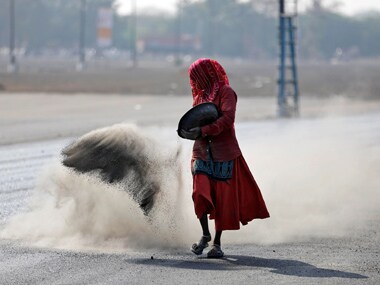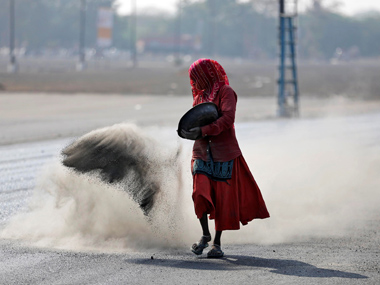Is the Rs 9 lakh crore booster shot that finance minister Arun Jaitley announced at his press conference on Tuesday just what the sluggish economy needed? Yes, it may be, despite a few devils lurking in the details. The only complaint at this point of time is – why didn’t this come earlier? But better late than never, though it is not clear if this will bring political benefits for the government by 2019. After all, the bank recapitalisation is spread over two years and the roads projects over a slightly longer period. Seen from the point of view of the economy alone, however, this is as good as it gets. How will the spending package boost the economy and will it send fiscal consolidation for a huge toss? [caption id=“attachment_4173649” align=“alignleft” width=“380”]  Reuters[/caption] The bank recapitalisation plan is, as most reactions are terming it, huge, even unprecedented. Banks were not lending for two reasons. One, they didn’t have much money to spare, labouring as they were under the NPA burden. Now, they will get money to restructure the bad loans as well as lend to projects, something the economy sorely needs at this point of time. But are there projects to lend to, given capacity utilisation in the projects is still around 70 percent? A big private consumption push was needed to get investment demand going. That could well come from the big infrastructure push, which will boost demand not just in sectors like steel, cement and other industries involved in roads construction but also consumer goods. The consumer goods demand is going to get pushed by increased employment. Economists like Siddhartha Roy, economic advisor to the Tata group, and Rathin Roy, member of the Prime Minister’s Economic Advisory Council, have been pointing out that the consumption boost the economy needs will not come from big ticket items like cars and consumer durables bought by the middle classes, but by fast moving consumer goods purchased by people just coming into the market. Devendra Pant of India Ratings points out that the marginal propensity to consume of this group is higher than that of the middle class. This section - those at the bottom of the pyramid – could see employment opportunities opening up thanks to the construction boom, even with high levels of mechanisation in road construction projects. The finance ministry expects 14.2 crore mandays of jobs to be generated by the road programme. Indeed, the thumb rule is that every one km of roads built create around 470 mandays of employment. Employment could also get a boost because, as a State Bank of India Ecoflash report notes, the recapitalisation programme could see increased lending to small-scale units under the MUDRA scheme. And let’s not overlook the little policy support for the micro, small and medium sector announced on Tuesday – the compulsory registration of public sector firms on the Trade Receivables e-Discounting System (TReDS), a bill discounting platform that helps small firms with working capital issues, and other hand-holding measures that it sorely needs. The MSME sector is the biggest employment generator in the Indian economy. What the roads programme is also going to do is boost economic activity in regions that were more or less out of the loop like border areas. The projects for connecting economically important nodes, for example, are longer stretches than the current routes between, say, Ajmer and Ludhiana or Mumbai and Kochi, even as they cut down travelling time. But the longer route goes through hitherto poorly connected areas. And then there’s the renewed thrust on rural roads. So these areas could see an employment boost as well as generate a consumption boost. All this is great news, but what about the likely fiscal risks? Can the government afford to go easy on fiscal consolidation at this point of time? The finance ministry has said it will stick to the fiscal deficit target of 3.2 percent for this fiscal. It could well manage that and not just because the spending is spread over two years for recapitalisation and three or more years for the roads construction plan. Remember, over 60 percent of the financing for recapitalisation – Rs 1.35 lakh crore – is going to be through bonds. Of course, one will have to wait until December to see how they are structured. Of the remaining Rs 76,000 crore, which will come from the budget, Rs 10,000 crore had already been provided in this year’s budget and in his budget speech, Jaitley had said “additional allocation will be provided, as may be required”. But the bonds will increase the government’s debt-to-GDP ratio and it’s not quite clear how rating agencies will view that. Also, there will be some government guarantee involved so there could be fiscal risks in the long term, says Pinaki Chakraborty of the National Institute of Public Finance and Policy. The design of the bonds, according to him, should try and ensure that the long term fiscal risk is kept to the minimum. As for the spending on roads, some parts of it had already been budgeted for - this year’s budget allocation of Rs 64,900 crore had factored in 2,000 km of coastal connectivity which formed part of Tuesday’s announcement, as well as a big push for the Pradhan Mantri Gram Sadak Yojana (which had got Rs 19,000 crore central funding). In any case, the government is thinking of a range of off-budget financing options – raising money from the market, private investments, toll-operate-transfer (ToT) projects and tolls, monetising operating highways (something that is already being done). What about the fiscal risks in the future? Sunil Sinha of India Ratings believes the government would have factored this into the glide path of fiscal consolidation. If the economy picks up as a result of these initiatives over the next couple of years, tax collections could pick up. Improved tax administration and the GST will lead to an increase in tax buoyancy, mitigating fiscal risks in the medium term. The big announcements have spelt out the government’s commitment to do something about the economy, but will this remain just a statement of intent? The key will be to watch the government’s actions closely from now on. Will next year’s budget actually step up outlays on roads, on the lines of what was announced on Tuesday? More importantly, do the implementing agencies – the National Highways Authority of India, National Highways and Infrastructure Development Corporation Ltd, Ministry of Road Transport and Highways and state Public Works Departments – have the capacity to undertake such massive projects? Apparently the government is planning substantial delegation of powers to ensure this, but that question will not go away. Giving out projects as public-private partnerships (PPPs) may help, but that has not worked very well in India. In any case, until the twin balance sheet problem is solved the private sector’s bidding for roads projects is likely to be subdued. The best bet could be, as Vinayak Chatterjee, chairman and managing director of Feedback Infra, keeps pointing out, for the government to just give out large engineering procurement and construction (EPC) contracts to private construction firms. This can be done for at least the projects which may not be financially attractive to the private sector. A range of financing options – ToT, hybrid annuity, build-operate-transfer etc – could be used to get private investment in other projects with high traffic volume. The heavy lifting now will have to be done by Nitin Gadkari, minister of roads transport and highways. He is a practical man with a good ear for innovative business models and he may be able to get things done. Tuesday’s announcement was the government’s way of saying it not only delivers shocks to the economy, it also knows how to get it to recover. Now its actions will have to measure up to its words.
A big private consumption push could well come from the infrastructure push, which will boost demand not just in sectors like steel, cement and other industries involved in roads construction but also consumer goods
Advertisement
End of Article


)

)
)
)
)
)
)
)
)



